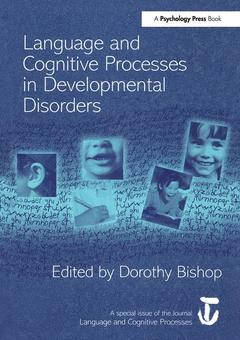Description
Language and Cognitive Processes in Developmental Disorders
A Special Issue of Language and Cognitive Processes
Special Issues of Language and Cognitive Processes Series
Coordinator: Bishop Dorothy
Language: English
Subject for Language and Cognitive Processes in Developmental Disorders:
Publication date: 01-2019
· 17.4x24.6 cm · Paperback
Publication date: 05-2001
· 17.4x24.6 cm · Hardback
Description
/li>Contents
/li>Readership
/li>Biography
/li>
This Special Issue encompasses studies of a wide range of developmental disorders, including Specific Language Impairment (SLI), reading disability, Williams Syndrome, hearing impairment and autistic disorder. Chiat contributes a theoretical analysis of the underlying nature of Specific Language Impairment, questioning whether it is appropriate to focus on a narrow domain of linguistic functioning, such as morphosyntax, and suggesting instead that we need to see how children are able to carry out mapping operations between the domains of phonology, syntax and semantics.
Three papers focus primarily on aspects of grammatical morphology: Van der Lely and Ullman consider past tense morphology in children with SLI and Thomas et al use similar tasks with children with Williams Syndrome, questioning the theoretical interpretation of deficits that has previously been made. Volterra et al remind us that a focus solely on English-speaking children can be misleading - they uncover intriguing grammatical deficits in Italian-speaking people with Williams Syndrome, and note how these contrast with the pattern found in deaf individuals learning oral language.
Dockrell et al and Nation et al both consider a relatively underinvestigated topic - children's naming errors, examining evidence for phonological and semantic bases to word-finding difficulties in contrasting groups: children with SLI in the case of Dockrell et al, and those with reading disability in the case of Nation et al. Traditionally, SLI and autistic disorder have been regarded as quite separate, but this view is questioned by Kjelgaard and Tager-Flusberg, who note intriguing parallels between the linguistic deficits found in these two syndromes. Finally, Evans et al investigate the neglected topic of how gesture is integrated with speech in conveying information, noting that these modes of expression may diverge in children with SLI.
Overall, the research reported in this Special Issue emphasises the importance of studying how language difficulties manifest in development, and show that there are many different routes to language acquisition, some more efficient than others.
S. Chiat, Mapping Theories of Developmental Language Impairment: Premises, Predictions and Evidence. M.S.C. Thomas, J. Grant, Z. Barham, M. Gsodl, E. Laing, L. Lakusta, L.K. Tyler, S. Grice, S. Paterson, A. Karmiloff-Smith, Past Tense Formation in Williams Syndrome. H.K.J. van der Lely, M.T. Ullman, Past Tense Morphology in Specifically Language Impaired and Normally Developing Children. V. Volterra, O. Capirci, M.C. Caselli, What Atypical Populations Can Reveal about Language Development: The Contrast Between Deafness and Williams Syndrome. K. Nation, C.M. Marshall, M.J. Snowling, Phonological and Semantic Contributions to Children's Picture Naming Skill: Evidence from Children with Developmental Reading Disorders. J.E. Dockrell, D. Messer, R. George, Patterns of Naming Objects and Actions in Children with Word Finding Difficulties. M.M. Kjelgaard, H. Tager-Flusberg, An Investigation of Language Impairment in Autism: Implications for Genetic Subgroups. J.L. Evans, M.W. Alibali, N.M. McNeil, Divergence of Verbal Expression and Embodied Knowledge: Evidence from Speech and Gesture in Children with Specific Language Impairment.




